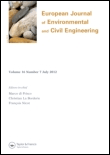
European Journal of Environmental and Civil Engineering
Scope & Guideline
Transforming Knowledge into Action for a Sustainable Built Environment
Introduction
Aims and Scopes
- Sustainable Construction Materials:
Research on eco-friendly materials, including the use of recycled aggregates, industrial by-products, and alternative binders to enhance the sustainability and durability of construction materials. - Geotechnical Engineering and Soil Mechanics:
Studies focused on the behavior of soils under various conditions, including consolidation, erosion, and stabilization techniques, as well as the use of numerical modeling to predict soil behavior. - Structural Engineering Innovations:
Exploration of advanced structural systems and materials, including fiber-reinforced composites, hybrid systems, and the impact of environmental factors on structural performance. - Environmental Engineering and Impact Assessment:
Research addressing the environmental impacts of construction and infrastructure projects, including pollutant management, sustainability assessments, and life cycle analyses. - Risk Assessment and Management in Civil Engineering:
Studies focusing on the assessment of risks associated with structural failures, natural disasters, and environmental hazards, employing probabilistic and statistical methods.
Trending and Emerging
- Advanced Computational Modeling Techniques:
There is a rising trend in the application of machine learning, artificial intelligence, and advanced numerical simulation methods to predict material behavior and structural performance under various conditions. - Sustainable and Green Building Practices:
An increasing focus on sustainable construction practices, including the use of bio-based materials, energy-efficient designs, and life cycle assessments to minimize environmental impacts. - Smart Materials and Structural Health Monitoring:
Research on the use of smart materials and innovative monitoring techniques to enhance the performance and safety of structures, including the integration of IoT for real-time data collection. - Climate Change Adaptation Strategies:
Emerging studies emphasize the need for resilience in civil engineering practices to address the impacts of climate change, including flood management, heat resilience, and infrastructure adaptation. - Waste Utilization in Construction:
Growing interest in the utilization of industrial and agricultural waste products in construction materials, aiming to reduce environmental footprints and promote circular economy principles.
Declining or Waning
- Traditional Materials Testing Methods:
The focus on conventional materials testing techniques has decreased as more advanced, non-destructive testing methods and computational modeling approaches gain traction. - Basic Geotechnical Investigations:
There has been a noticeable decline in research centered around fundamental geotechnical investigations, with a shift towards more innovative and complex modeling techniques. - Manual Structural Analysis Techniques:
As computational tools and software become more sophisticated, the reliance on manual calculations and traditional hand methods for structural analysis has diminished.
Similar Journals
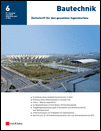
Bautechnik
Pioneering research in construction and structural integrity.Bautechnik is a premier academic journal in the fields of Building and Construction and Civil and Structural Engineering, published by ERNST & SOHN in Germany. With a history dating back to 1969 and a significant converged timeline through various years, this journal offers a rich repository of peer-reviewed research dedicated to advancing the principles, methodologies, and innovations within its domains. Bautechnik is currently ranked in the Q3 category for both building and construction, as well as civil and structural engineering, indicating its relevance and contribution to the academic community. Though it does not offer open access, its curated content is accessible to a global audience of researchers, professionals, and students striving for excellence in their fields. The journal aims to foster discussions and disseminate knowledge that impacts the future of construction, architecture, and engineering practices.

Infrastructures
Empowering Knowledge Exchange in Materials Science and BeyondInfrastructures is a distinguished open-access journal, published by MDPI since 2016, dedicated to advancing the fields of engineering and construction through interdisciplinary research and critical insights. Based in Switzerland, it serves a global community of scholars and professionals, providing a platform for innovative studies that drive progress in Building and Construction, Civil and Structural Engineering, Computer Science Applications, Geotechnical Engineering and Engineering Geology, and various aspects of Materials Science. With an impressive impact factor and a positioning in the Q2 category across multiple engineering fields, the journal's robust ranking reflects its commitment to high-quality research, with notable Scopus rankings showcasing its significant contribution to academic discourse. Infrastructures not only facilitates open access to essential knowledge but also aims to bridge the gap between theory and practical application, making it an invaluable resource for researchers, industry professionals, and students alike.
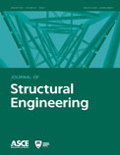
JOURNAL OF STRUCTURAL ENGINEERING
Pioneering Research in Structural IntegrityThe JOURNAL OF STRUCTURAL ENGINEERING, published by the ASCE-AMERICAN SOCIETY OF CIVIL ENGINEERS, is a premier academic journal that focuses on the latest advancements in the field of structural engineering. With a rich history dating back to 1955, this journal has become a crucial platform for disseminating peer-reviewed research that addresses critical issues and innovative solutions in building and construction, civil and structural engineering, materials science, and mechanics. It proudly holds a Q1 quartile ranking across multiple categories in the 2023 Scopus rankings, indicating its influential presence in the academic community. The journal does not currently offer open access options, ensuring that the content is rigorously vetted for quality and relevance, thus appealing to researchers, industry professionals, and students seeking credible, impactful research. With contributions from leading experts, the JOURNAL OF STRUCTURAL ENGINEERING is essential reading for anyone interested in advancing their understanding and practice within this vital area of engineering.

Periodica Polytechnica-Civil Engineering
Transforming Infrastructure Through Cutting-Edge InsightsPeriodica Polytechnica-Civil Engineering is a prestigious journal published by the Budapest University of Technology and Economics, dedicated to advancing the field of civil engineering through high-quality research and innovative practices. Established in 1972, the journal has transitioned through various phases of publication and now spans an expansive range of topics within civil and structural engineering, geotechnical engineering, and engineering geology. With an impact factor indicating its growing influence and a commendable placement in the Q3 quartile according to the latest 2023 metrics, it recognizes contributions that bridge theoretical advancements with practical applications. While currently not open access, the journal remains a vital resource for researchers, professionals, and students seeking to stay abreast of the latest developments in engineering design, construction techniques, and geotechnical innovations. The continuous publication of significant research after almost five decades underscores its commitment to disseminating knowledge crucial for the world’s infrastructure challenges, making it an essential reference point within the engineering community.
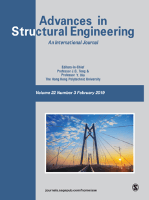
ADVANCES IN STRUCTURAL ENGINEERING
Unveiling Breakthroughs in Structural EngineeringADVANCES IN STRUCTURAL ENGINEERING, published by SAGE PUBLICATIONS INC, is a leading journal dedicated to the advancement of knowledge in the fields of Building and Construction, as well as Civil and Structural Engineering. With a solid impact factor and a commendable Scopus ranking (Rank #60 in Building and Construction, Rank #105 in Civil and Structural Engineering), this journal stands at the forefront of academic research, providing a platform for high-quality articles that contribute significantly to the discipline. Covering a range of topics from innovative construction techniques to sustainable engineering practices, the journal aims to foster collaborative dialogue among researchers, industry professionals, and students alike. As of 2023, it boasts impressive category quartiles, ranking Q1 in Building and Construction and Q2 in Civil and Structural Engineering. ADVANCES IN STRUCTURAL ENGINEERING is a vital resource for those looking to stay abreast of emerging trends and groundbreaking developments in structural engineering, promoting an environment of continuous learning and application of best practices. With a convergence of research from 1999 to 2024, the journal not only emphasizes theoretical frameworks but also bridges the gap between academia and practical application in engineering projects.

Magazine of Civil Engineering
Advancing Civil Engineering Knowledge for Tomorrow's InfrastructureMagazine of Civil Engineering, published by ST-PETERSBURG STATE POLYTECHNICAL UNIVERSITY, is a prominent open access journal dedicated to the field of civil and structural engineering. With an ISSN of 2712-8172 and E-ISSN 2071-0305, it serves as a vital platform for disseminating high-quality research, innovative methodologies, and current trends in building and construction. Since its inception in 2010, the journal has embraced open access, ensuring broad visibility and accessibility for its contributions to the academic community. The magazine holds a respectable position in the academic hierarchy, ranked in the Q3 quartile for both Building and Construction and Civil and Structural Engineering categories as of 2023. It is indexed in Scopus, amplifying its societal impact and reach with a rank of #114/223 in Building and Construction and #224/379 in Civil and Structural Engineering. Researchers, professionals, and students alike are encouraged to engage with the cutting-edge studies presented in the magazine, contributing to the advancement of knowledge and practice within the civil engineering domain.

Advances in Civil and Architectural Engineering
Transforming Ideas into Architectural ExcellenceAdvances in Civil and Architectural Engineering is a cutting-edge scholarly journal dedicated to the dissemination of pioneering research in the realm of civil engineering and architecture. Published by the esteemed Josip Juraj Strossmayer University of Osijek, Faculty of Civil Engineering and Architecture, this journal operates under an Open Access model since 2022, allowing for unrestricted access to its rich repository of articles. The journal aims to bridge the gap between academia and industry by providing a platform for innovative studies, technical advancements, and best practices that contribute to the evolution of sustainable construction and architectural design. With its focus on interdisciplinary approaches and contemporary challenges in the field, Advances in Civil and Architectural Engineering serves as an invaluable resource for researchers, professionals, and students seeking to enhance their understanding and impact in this vital area of engineering. The journal's ISSN is 2975-3848, and it is committed to fostering the advancement of knowledge and collaboration within the global engineering community.

KSCE Journal of Civil Engineering
Exploring New Frontiers in Structural DesignKSCE Journal of Civil Engineering is a prestigious international publication dedicated to advancing the field of civil engineering. Established by the Korean Society of Civil Engineers (KSCE), this journal serves as a vital platform for high-quality research in the discipline, showcasing innovative methodologies, case studies, and critical analyses pertinent to civil and structural engineering. With an impact factor placing it in the Q2 category of civil engineering journals for 2023 and a solid Scopus rank of #141 out of 379, it reflects the significant contributions of its authors and the growing recognition of its published works. KSCE Journal of Civil Engineering, based in Germany and easily accessible to the global research community, is committed to disseminating knowledge with rigor and integrity, encouraging both emerging scholars and seasoned experts to contribute to the evolving discourse in civil engineering. With a convergence period from 2009 to 2024, the journal continues to uphold its mission of fostering innovation and excellence in engineering practice.
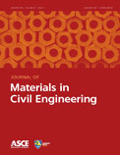
JOURNAL OF MATERIALS IN CIVIL ENGINEERING
Exploring the Future of Building MaterialsJOURNAL OF MATERIALS IN CIVIL ENGINEERING is a highly regarded publication within the field of civil engineering, published by the ASCE-American Society of Civil Engineers. This journal, which has been actively contributing to the discourse in building and construction materials since 1989, has established itself as a vital resource for researchers and practitioners alike, evidenced by its impressive Q1 rankings across multiple categories, including Building and Construction, Civil and Structural Engineering, Materials Science, and Mechanics of Materials as of 2023. With a strong focus on innovation and application in materials technology, it provides insights that are paramount for advancing practices in civil engineering. The journal's commitment to disseminating high-quality research is reflected in its exceptional standing within Scopus, where it ranks in the top quartile of its respective fields. Although not an open-access journal, it remains an essential platform for disseminating impactful research findings and fostering professional development in the materials science community. For more information or to explore the latest publications, researchers can access the journal through the ASCE library.

Civil Engineering Journal-Stavebni Obzor
Innovative Research, Unbound by BarriersWelcome to the Civil Engineering Journal-Stavebni Obzor, an esteemed academic publication dedicated to advancing the field of civil engineering. Published by the Czech Technical University in Prague, Faculty of Civil Engineering, this journal has provided a platform for innovative research and critical discourse since its inception. With an ISSN of 1210-4027 and an E-ISSN of 1805-2576, this Open Access journal has been facilitating wide dissemination of knowledge in civil engineering since 2014, ensuring that valuable research reaches a global audience without barriers. The journal is committed to fostering collaboration among researchers, professionals, and students, encouraging the exchange of ideas that drive the discipline forward. Its diverse scope encompasses various aspects of civil engineering, making it an essential resource for anyone looking to stay at the forefront of this dynamic field. Located in Prague, a hub of engineering excellence, this journal not only reflects the latest trends and innovations but also contributes to shaping the future of civil engineering.